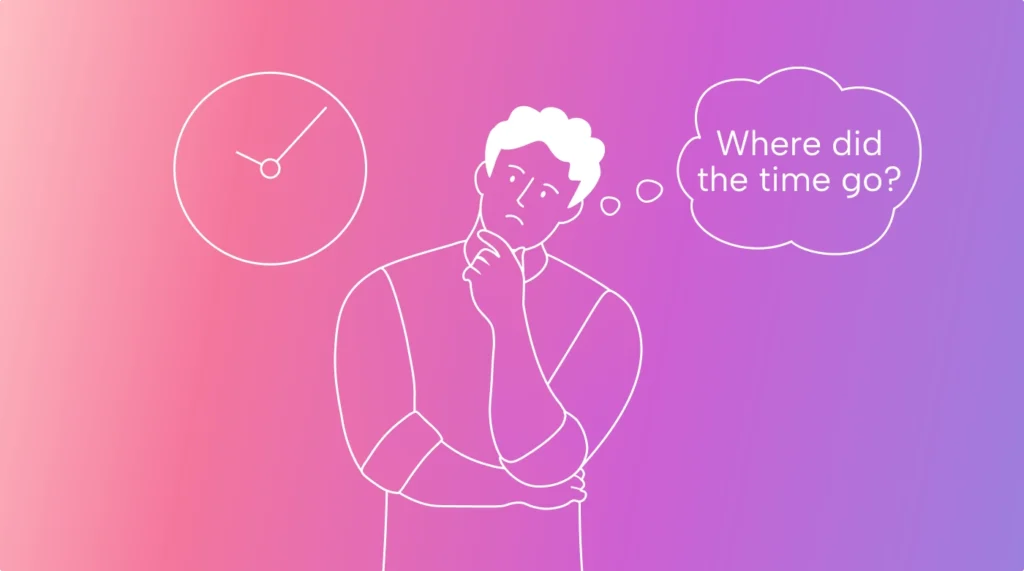Time blindness ADHD refers to the difficulty individuals with ADHD experience in perceiving and managing time effectively. Unlike a typical awareness of time passing, people with ADHD often struggle to sense how much time has elapsed or how long tasks will take. This can result in chronic lateness, missed deadlines, and feeling overwhelmed by time-sensitive demands.
Time blindness isn’t about a lack of discipline or laziness—it’s a neurological challenge rooted in how the ADHD brain processes time. The condition can affect short-term planning (like completing daily tasks) and long-term goals (such as meeting future deadlines). It stems from issues with executive functions, particularly the ability to plan, prioritize, and stay organized.
For someone with ADHD, time often feels abstract or “slippery,” making it hard to transition between activities or to anticipate future consequences. This phenomenon explains why individuals with ADHD often feel like they’re either rushing to catch up or have all the time in the world—leading to the cycle of procrastination and stress.
Understanding time blindness ADHD is the first step toward managing its effects and implementing strategies to navigate daily life more effectively.
The Science Behind Time Blindness ADHD
Time blindness in ADHD is deeply rooted in the brain’s executive functioning and how it processes time. The prefrontal cortex, responsible for tasks like planning, prioritizing, and self-regulation, often functions differently in individuals with ADHD. These differences can make it challenging to estimate time accurately, visualize future outcomes, or maintain a consistent awareness of time passing.
Key Neurological Factors:
- Dysregulation of Dopamine
- ADHD is linked to lower levels of dopamine, a neurotransmitter crucial for motivation and reward. This deficiency can impair the brain’s ability to recognize the importance of time-based tasks and sustain focus over prolonged periods.
- Impaired Working Memory
- Working memory, the mental workspace that helps us juggle tasks and remember deadlines, is often weaker in people with ADHD. This makes it harder to keep track of what needs to be done and when, contributing to time blindness.
- Delayed Temporal Processing
- Temporal processing refers to the brain’s ability to measure and track time intervals. Studies have shown that individuals with ADHD struggle to estimate time accurately, often perceiving it as moving faster or slower than it actually is.
- Hyperfocus and Time Distortion
- A hallmark of ADHD is hyperfocus, where an individual becomes so deeply engrossed in an activity that they lose track of time entirely. While hyperfocus can be productive, it often exacerbates time blindness, leading to missed commitments or deadlines.
The Two Modes of ADHD Time Perception:
- “Now” Mode
- For people with ADHD, time often feels divided into “now” and “not now.” Tasks that aren’t immediately pressing can seem irrelevant, making it hard to plan for the future.
- “Urgency” Mode
- When a deadline is imminent, the sense of urgency can trigger a flurry of activity, but this often results in rushed or incomplete work.
Understanding the science behind time blindness ADHD can help individuals and their support systems develop targeted strategies, such as using visual timers, setting reminders, and breaking tasks into smaller, manageable steps. By addressing the root neurological causes, it’s possible to mitigate the effects of time blindness and improve daily functioning.
Signs and Symptoms of Time Blindness in ADHD

Time blindness ADHD manifests in a variety of ways, often impacting an individual’s ability to manage their daily responsibilities effectively. Recognizing these signs is essential for understanding how this condition affects those with ADHD and finding strategies to cope. Here are the most common signs and symptoms:
1. Chronic Lateness
- Individuals with time blindness ADHD often struggle to arrive on time for appointments, work, or social gatherings. This happens because they underestimate how long tasks will take or fail to account for transitions between activities.
2. Difficulty Estimating Time
- A hallmark of time blindness ADHD is an inability to gauge how much time has passed or how much is needed to complete a task. This leads to frequent misjudgments, such as starting projects too late or running out of time.
3. Procrastination and Last-Minute Rushes
- People with ADHD often delay starting tasks until they feel an urgent deadline looming. Time blindness contributes to this behavior by making future deadlines feel abstract or distant until the last possible moment.
4. Getting “Stuck” in Activities
- Hyperfocus, a common symptom of ADHD, can cause individuals to lose track of time completely. They may become so absorbed in one task that they neglect others or forget appointments.
5. Forgetting Appointments and Deadlines
- Time blindness ADHD can make it hard to keep track of schedules, even with reminders. This often leads to forgotten commitments, missed deadlines, or showing up late.
6. Struggling with Transitions
- Moving from one activity to another can be particularly challenging. Individuals with time blindness ADHD may have trouble stopping a current task or preparing for the next one.
7. Feeling Overwhelmed by Time-Sensitive Tasks
- Deadlines or time-bound obligations often feel overwhelming because people with ADHD struggle to break them into smaller, manageable steps. This can result in avoidance or stress.
8. Living in the “Now” or “Not Now” Mode
- Time blindness ADHD creates a skewed perception of time, dividing it into “now” (what’s happening immediately) and “not now” (everything else). This can lead to prioritizing immediate gratification over long-term planning.
9. Frequent Use of “Time Crutches”
- Many individuals rely heavily on external tools like alarms, calendars, or timers to compensate for their time blindness. While these tools help, the need for constant external reminders is a sign of the underlying struggle.
Conclusion
Recognizing the signs and symptoms of time blindness ADHD can help individuals and caregivers develop better coping strategies. Tools like structured schedules, visual timers, and ADHD-specific planners can make a significant difference in managing the effects of time blindness and improving time management skills.
How Time Blindness Affects Daily Life
Time blindness ADHD can disrupt nearly every aspect of daily life, making it difficult to maintain routines, manage responsibilities, and sustain relationships. Unlike typical time management struggles, time blindness ADHD stems from a neurological difference that affects how time is perceived and prioritized. Here’s how it impacts various facets of life:
1. Work and Productivity
- Struggling to estimate how long tasks will take can lead to missed deadlines or incomplete projects. Time blindness ADHD often results in procrastination followed by frantic, last-minute efforts, reducing overall productivity and work quality.
2. Daily Routines
- Simple tasks like getting ready for work, preparing meals, or running errands can feel overwhelming without a clear sense of time. This can lead to constant rushing or forgetting essential steps in a routine.
3. Relationships
- Being consistently late or forgetting plans can strain personal and professional relationships. Friends and family might misinterpret these behaviors as inconsiderate, leading to misunderstandings and frustration.
4. Stress and Overwhelm
- The inability to organize time effectively often creates a cycle of stress. Tasks pile up, deadlines loom, and the individual feels perpetually behind, leading to burnout and anxiety.
5. Financial Management
- Time blindness ADHD can cause missed bill payments, late fees, or impulsive purchases due to a lack of planning. Over time, these patterns can lead to financial instability and stress.
6. Health and Self-Care
- Forgetting to schedule or attend medical appointments, skipping exercise, or neglecting proper nutrition are common consequences. Time blindness ADHD often makes self-care feel like a low priority amidst other demands.
7. Social Life
- Missing social gatherings, arriving late, or double-booking commitments can lead to social isolation. Over time, these patterns can erode friendships and make it harder to maintain a vibrant social life.
8. Parenting Challenges
- For parents with ADHD, time blindness can make managing children’s schedules, homework, and extracurricular activities particularly challenging. This can lead to feelings of guilt and inadequacy.
9. Hobbies and Personal Growth
- Pursuing long-term goals or hobbies often takes a backseat because time feels intangible. This can limit personal fulfillment and lead to a sense of stagnation.
Conclusion
Time blindness ADHD affects many areas of life, but understanding its impact is the first step toward improvement. By using practical tools like alarms, planners, and ADHD-friendly strategies, individuals can regain control over their time and lead more balanced, productive lives.
Why ADHD Makes Time Management Difficult
Time management can be especially challenging for individuals with ADHD due to how the condition affects the brain’s executive functions. These functions are responsible for planning, prioritizing, and organizing tasks—skills that are directly tied to effective time management. Here’s why ADHD creates unique hurdles in managing time:

1. Impaired Executive Functioning
- The prefrontal cortex, the part of the brain responsible for planning and decision-making, works differently in individuals with ADHD. This impairment affects the ability to prioritize tasks, estimate time, and transition smoothly between activities.
2. Time Blindness ADHD
- One of the most significant obstacles is time blindness, the difficulty in perceiving and understanding the passage of time. For individuals with ADHD, time often feels abstract, leading to a focus on immediate tasks while future ones are neglected until they become urgent.
3. Dopamine Dysregulation
- ADHD is associated with lower dopamine levels, which affect motivation and reward processing. Tasks that don’t provide immediate gratification feel less compelling, making it harder to stay focused on time-sensitive responsibilities.
4. Hyperfocus and Time Distortion
- People with ADHD can experience hyperfocus, where they become so engrossed in one activity that they lose track of time. While this can sometimes be productive, it often results in neglected priorities and missed deadlines.
5. Procrastination Due to Overwhelm
- The ADHD brain often struggles with breaking tasks into smaller steps, making projects seem overwhelming. This leads to procrastination, as individuals avoid starting tasks until the deadline becomes urgent.
6. Difficulty Transitioning Between Tasks
- Switching from one activity to another requires cognitive effort, which can feel disproportionately difficult for individuals with ADHD. This challenge often leads to delays in starting new tasks or moving on to the next responsibility.
7. Poor Working Memory
- Working memory, the ability to hold and manipulate information in the short term, is often weaker in individuals with ADHD. This can make it harder to remember what tasks need to be done and when, contributing to missed deadlines or forgotten commitments.
8. Living in “Now” vs. “Not Now”
- People with ADHD tend to perceive time in two categories: “now” and “not now.” This binary view can make long-term planning difficult, as tasks that don’t feel immediate are often deprioritized.
9. Emotional Dysregulation
- Stress, frustration, or boredom can make time management even harder for individuals with ADHD. These emotions can derail focus, leading to further delays and difficulty staying on track.
Conclusion
ADHD fundamentally alters how individuals perceive and interact with time, making time management an ongoing struggle. However, understanding these challenges is the first step toward overcoming them. Tools like timers, structured routines, and ADHD-friendly strategies can help individuals develop better time management skills and regain control over their daily lives.
Best Tools and Apps to Combat Time Blindness ADHD
Here’s a table showcasing the best tools and apps to combat time blindness ADHD :
| Tool/App | Description | Key Features |
| Listastic | A checklist app for organizing tasks into active, later, and completed sections. | Color-coding, task sharing, and categorization of to-dos. |
| Coach.me | A habit-building app combining social networking with daily tracking. | Goal-setting, tracking, and community support for accountability. |
| Finish | A task manager that categorizes tasks by short-term, mid-term, and long-term deadlines. | Alerts for upcoming deadlines and an intuitive task organization interface. |
| 2Do | A versatile task manager for reminders, checklists, and larger projects. | Tab system for clarity, color-coded tasks, and flexible project management. |
| 30/30 | An app using sequential countdown timers to guide users through tasks. | Visual timers and task prioritization tools. |
| TeuxDeux | A minimalist task manager with a five-day view for planning tasks. | Cross-device synchronization and simple, intuitive task scheduling. |
| EpicWin | A gamified to-do list app that turns tasks into a role-playing game. | Rewards, points, and treasures for completed tasks. |
| Evernote | A comprehensive app for storing and organizing text, photo, and audio notes. | Notebook creation, search functionality, and multi-format note storage. |
| Priority Matrix | A prioritization tool that sorts tasks into four quadrants based on urgency and importance. | Helps with prioritization and task clarity for better time management. |
These tools are designed to support individuals with ADHD by addressing key challenges associated with time blindness ADHD, such as task tracking, prioritization, and time perception. Let me know if you’d like details on any specific tool!


